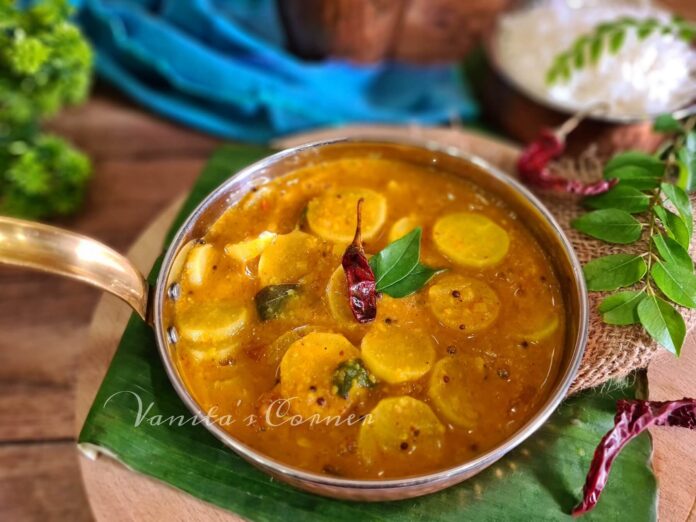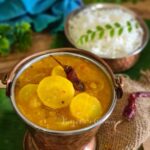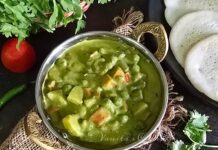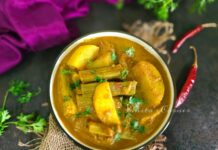Mullangi Sambar – an easy South Indian curry made with radish, lentils and spices.
Sambar is a popular dish from South Indian cuisine. It is a flavourful and nutritious curry /stew made using lentils, vegetables and spices. Sambar is a staple dish of southern India and is prepared differently in different states of south India. For example, in Tamil Nadu, sambar is typically made with tuvar dal and vegetables whereas in Karnataka, coconut is used to make sambar.
Sambar powder is an important condiment in making sambar. Sambar powder is a blend of spices that gives distinctive flavour to sambar. Sambar is a versatile dish and can be served with variety of accompaniments. It can be served with rice, idli, dosa, vada, upma etc.
Jump to
About Mullangi Sambar
Mullangi Sambar is a variation of the classic South Indian sambar and is made with radish instead of other commonly used vegetables in sambar. The radishes add a unique flavour and texture to the sambar. Mullangi Sambar is particularly popular in Tamil Nadu. It pairs well with rice alongwith papad and pickle on the side. It can be served with idli, dosa, vada etc.
To make Mullangi sambar, chopped radish is cooked alongwith onion and tomato, to which tamarind pulp, cooked, mashed tuvar dal and sambar powder is added. It is finally tempered with mustard seeds, udad dal, curry leaves and dry red chillies.
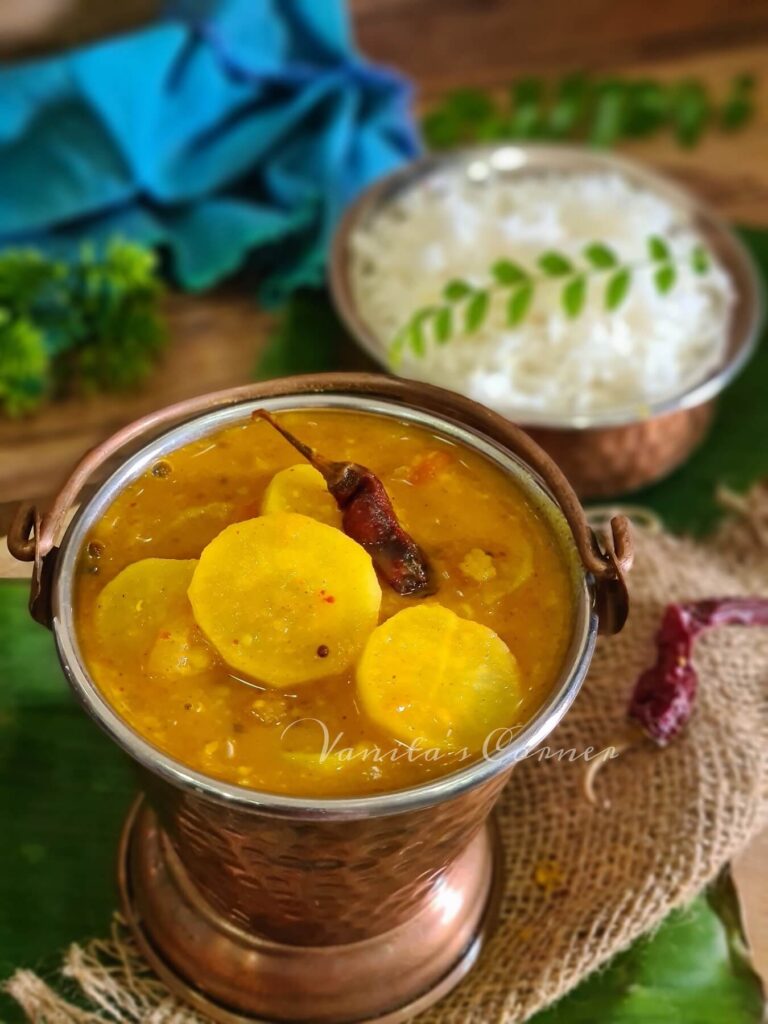
List of ingredients to make Mullangi Sambar
Vegetables : Radish, onion, tomato
Spices : mustard seeds, fenugreek seeds (methi), turmeric powder, sambar powder
Lentils : Tuvar dal (split pigeon peas)
Other ingredients : curry leaves, asafoetida (hing), oil , tamarind, jaggery, salt
Tempering : oil, mustard seeds, udad dal, curry leaves, dry red chillies
Step-wise recipe with pictures
Wash and soak split pigeon peas (tuvar dal) for 30 to 40 minutes.
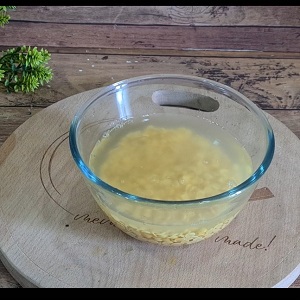
Soak a lemon sized ball of tamarind in half a cup of water for 30 minutes. After 30 minutes, squeeze the tamarind with your fingers and mash. Strain and keep tamarind pulp aside.
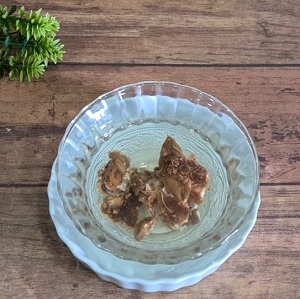
After 40 minutes, drain the water from soaked dal and transfer it to a pressure cooker. Add 2 cups of water, turmeric powder and salt. Pressure cook for 4 to 5 whistles.
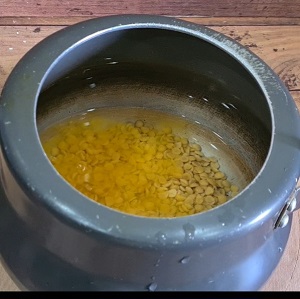
Open the pressure cooker when the steam escapes completely. Whisk cooked dal and keep aside.
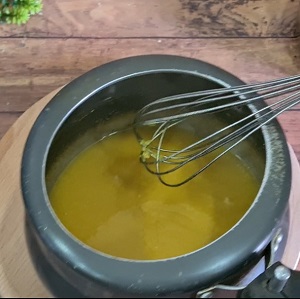
Wash 2 radishes. Chop the leaves. The leaves can be used to make sabzi or paratha.
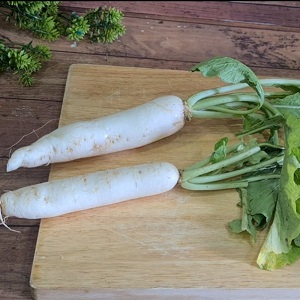
Peel the radishes and cut them into circles. Keep chopped radish aside.
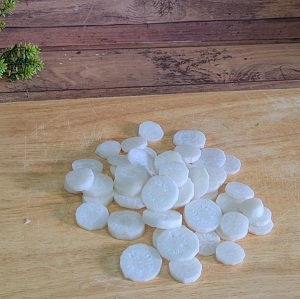
Heat 1 tbsp oil in a pan. Add mustard seeds, methi seeds, asafoetida, curry leaves and saute for few seconds.
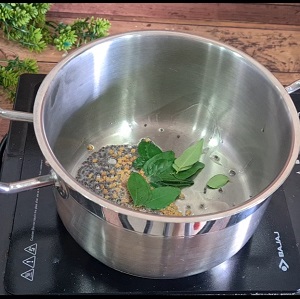
Add chopped onion and saute.
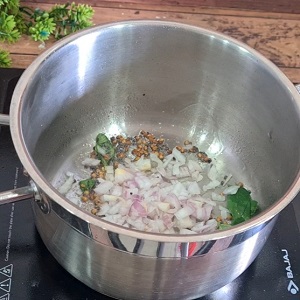
Next, add chopped tomato and saute for a minute.
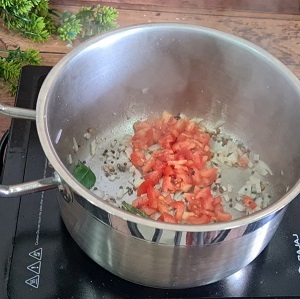
Add chopped radish and mix.
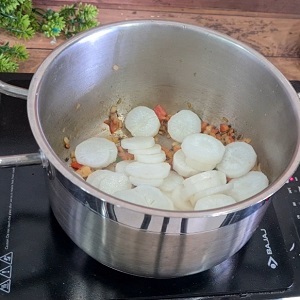
Add ½ tsp turmeric powder and ½ cup water. Mix well. Cover and cook till the radish is cooked.
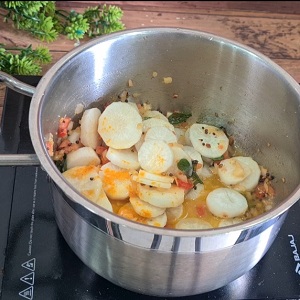
Add tamarind pulp, cooked dal and sambar powder. Mix well.
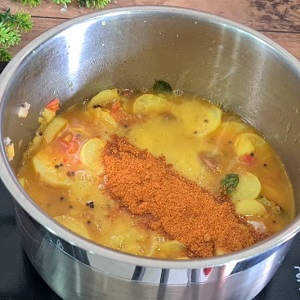
Now, add a small piece of jaggery, salt as required and some water to adjust the consistency of the sambar.
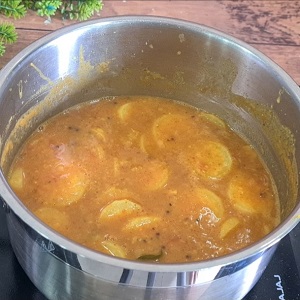
Cover and cook for 2 minutes.
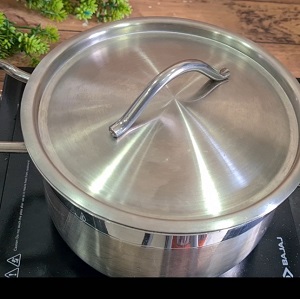
For tempering, heat 1 tbsp oil in a small pan. Add mustard seeds, udad dal, curry leaves and dry red chillies.
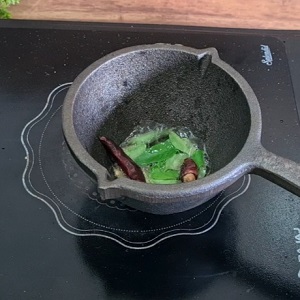
When the ingredients start sizzling, pour it into the sambar.
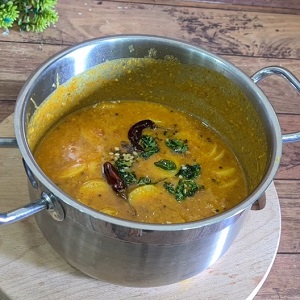
Serve Mullangi sambar with rice or idli/dosa.
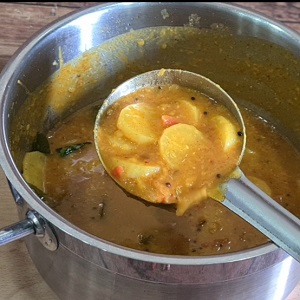
Recipe Card
Mullangi Sambar | Radish Sambar
Ingredients
- 2 radishes (mullangi/mooli)
- ½ cup split pigeon peas (tuvar dal)
- 1 small onion, chopped
- 1 small tomato, chopped
- 2 tbsp oil
- 1 tsp turmeric powder
- 1 tsp mustard seeds
- 1 tsp fenugreek (methi) seeds
- a sprig of curry leaves
- a pinch of asafoetida
- 4 tsp sambar powder
- a lemon sized ball of tamarind
- a small piece of jaggery
- salt to taste
For tempering
- 1 tbsp oil
- 1 tsp mustard seeds
- 1 tsp udad dal
- few curry leaves
- 2 dry red chillies
Instructions
- Wash and soak split pigeon peas (tuvar dal) for 30 to 40 minutes.
- Soak a lemon sized ball of tamarind in half a cup of water for 30 minutes.
- After 30 minutes, squeeze the tamarind with your fingers and mash. Strain and keep tamarind pulp aside.
- After 40 minutes, drain the water from soaked dal and transfer it to a pressure cooker.
- Add 2 cups of water, ½ tsp turmeric powder and salt.
- Pressure cook for 4 to 5 whistles.
- Open the pressure cooker when the steam escapes completely.
- Whisk cooked dal and keep aside.
- Wash 2 radishes. Chop off the leaves and keep aside. The leaves can be used to make sabzi or paratha.
- Peel the radishes and cut them into circles. Keep chopped radish aside.
- Heat 1 tbsp oil in a pan.
- Add mustard seeds, methi seeds, asafoetida, curry leaves and saute for few seconds.
- Add chopped onion and saute.
- Next, add chopped tomato and saute for a minute.
- Add chopped radish and mix.
- Add ½ tsp turmeric powder and ½ cup water. Mix well.
- Cover and cook till the radish is cooked.
- Add tamarind pulp,cooked dal and sambar powder. Mix well.
- Now, add a small piece of jaggery, salt as required and some water to adjust the consistency of the sambar.
- Cover and cook for 2 minutes.
- For tempering, heat 1 tbsp oil in a small pan.
- Add mustard seeds, udad dal, curry leaves and dry red chillies.
- When the ingredients start sizzling, pour it into the sambar.
- Serve Mullangi sambar with rice or idli/dosa.
Recipe Video
Related Recipes
Mangalorean Mixed Veg Sambar
Lentil based sambar
Radish Recipes
Stuffed Mooli Paratha
Red Radish Sabzi
Palak Mooli Saag
Thank you for stopping by. If you like/ tried this recipe, leaving a comment below the post will enable more readers and cooking enthusiasts to discover these recipes. Also, if you are on Instagram, do share a picture of the dish and tag @vanitascorner to be featured in my stories.
Do follow me on Instagram, Facebook and Pinterest.
Subscribe to my youtube channel for easy video recipes.
Happy Cooking!!

